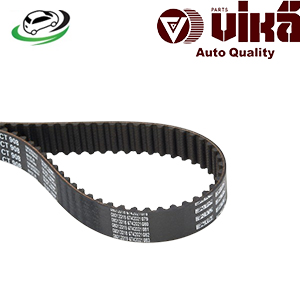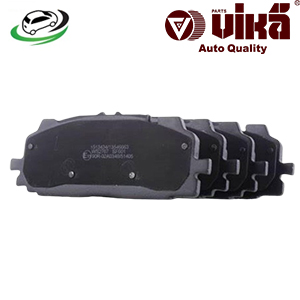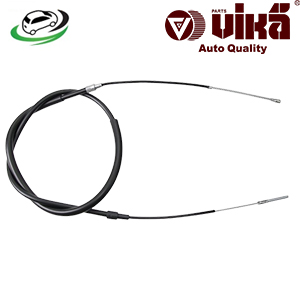-20%
Get Parking Brake Cable VW Golf II 16v/ Golf II 8v/ Golf II Diesel/ Jetta II 16v/ Jetta II 8v/ Jetta II Diesel 191609721
The parking brake cable is a vital component of a vehicle’s braking system, ensuring that the vehicle remains stationary when parked. This detailed guide will cover the function, design, importance, common issues, maintenance, and replacement of the parking brake cable.
Function of the Parking Brake Cable
The primary function of the parking brake cable is to engage the parking brake mechanism, which locks the vehicle’s wheels and prevents it from rolling when parked. Here’s a breakdown of how it works:
- Manual Activation: The parking brake cable is manually activated by the driver, either through a lever or a foot pedal. When the parking brake is engaged, the cable pulls on a lever attached to the brake shoes or calipers, applying pressure to the brake drums or discs.
- Locking the Wheels: The tension created by the parking brake cable when engaged causes the brake shoes or calipers to clamp onto the brake drums or discs. This action locks the wheels in place, preventing the vehicle from moving.
- Safety Mechanism: The parking brake cable acts as a secondary braking system, independent of the hydraulic brakes. It is especially useful as a backup in case of hydraulic brake failure and as a safety measure when parking on an incline.
- Preventing Vehicle Movement: The parking brake cable ensures that the vehicle does not move when parked, especially on sloped surfaces. This is crucial for preventing accidents or unintentional vehicle movement.
Components of the Parking Brake Cable System
The parking brake cable system consists of several key components that work together to ensure proper operation:
- Parking Brake Lever or Pedal: The parking brake lever or pedal is the control mechanism used by the driver to engage the parking brake. When the lever is pulled or the pedal is pressed, it pulls on the parking brake cable.
- Parking Brake Cable: The cable itself is typically made of steel and is designed to withstand the tension required to engage the parking brake. It runs from the parking brake lever or pedal to the rear wheels.
- Equalizer: The equalizer is a component that ensures even distribution of force between the two rear wheels when the parking brake is engaged. It helps maintain consistent braking pressure on both sides of the vehicle.
- Brake Shoes or Calipers: The parking brake cable is connected to the brake shoes (in drum brake systems) or calipers (in disc brake systems). When the cable is pulled, it causes these components to press against the brake drums or discs, locking the wheels.
- Return Springs: Return springs are used to disengage the parking brake when the lever or pedal is released. They ensure that the brake shoes or calipers return to their resting position, allowing the wheels to move freely.
Importance of the Parking Brake Cable
The parking brake cable is crucial for several reasons:
- Vehicle Stability: The parking brake cable ensures that the vehicle remains stationary when parked, preventing it from rolling away. This is particularly important when parking on hills or other inclined surfaces.
- Safety: The parking brake cable serves as a critical safety feature, providing a backup braking system in case of hydraulic brake failure. It helps to ensure that the vehicle can be brought to a stop and kept stationary even if the primary braking system fails.
- Compliance with Regulations: Many jurisdictions require that vehicles be equipped with a functional parking brake as part of road safety regulations. The parking brake cable is essential for meeting these legal requirements.
- Preventing Wear on Transmission: Engaging the parking brake when the vehicle is parked helps prevent unnecessary wear on the transmission, especially in vehicles with automatic transmissions. It reduces the strain on the parking pawl, a small component in the transmission that locks the wheels in place.
Common Issues with the Parking Brake Cable
Despite its durability, the parking brake cable can experience several issues over time. Common problems include:
- Cable Wear and Tear: The parking brake cable is subject to wear and tear due to constant use. Over time, the cable can become stretched, frayed, or even break, reducing its effectiveness.
- Corrosion: The parking brake cable is often exposed to moisture, road salt, and other corrosive elements. This can lead to rust and corrosion, which can weaken the cable and cause it to fail.
- Sticking or Binding: The cable may become sticky or bind due to corrosion or dirt buildup. This can cause the parking brake to remain engaged even after the lever or pedal is released, leading to dragging brakes and potential damage.
- Adjustments Required: Over time, the parking brake cable may stretch, leading to reduced tension and ineffective braking. Regular adjustments may be necessary to maintain proper tension and ensure effective operation.
- Failure to Release: In some cases, the parking brake cable may fail to release properly, preventing the vehicle from moving. This can be caused by a broken return spring, a seized cable, or other mechanical issues.
Signs of a Failing Parking Brake Cable
Recognizing the signs of a failing parking brake cable can help you address issues before they become more severe. Common symptoms include:
- Loose Parking Brake Lever or Pedal: If the parking brake lever or pedal feels loose or has excessive travel before it engages, it may be a sign of a stretched or damaged cable.
- Parking Brake Not Holding: If the parking brake fails to hold the vehicle in place, especially on an incline, it could indicate a problem with the cable or the brake components it controls.
- Difficulty Engaging or Releasing the Parking Brake: If you experience difficulty engaging or releasing the parking brake, it may be due to a sticking or binding cable. This can lead to the parking brake remaining engaged or failing to engage fully.
- No Resistance When Engaging the Parking Brake: If there is no resistance when you pull the parking brake lever or press the pedal, it could indicate a broken cable or a disconnected component in the system.
- Brake Warning Light: Some vehicles have a brake warning light on the dashboard that may illuminate if there is a problem with the parking brake system. This could be a sign of a failing parking brake cable or another issue in the braking system.
Maintenance and Replacement of the Parking Brake Cable
Proper maintenance and timely replacement of the parking brake cable are essential for ensuring optimal performance and safety. Here are some tips:
- Regular Inspection: During routine vehicle maintenance, have the parking brake cable inspected for signs of wear, corrosion, or damage. Pay attention to the condition of the cable, equalizer, and associated components.
- Keep It Clean: The parking brake cable is exposed to dirt, moisture, and debris, which can cause it to bind or corrode. Regularly clean the cable and surrounding areas to prevent buildup and reduce the risk of corrosion.
- Lubrication: Some parking brake cables may benefit from lubrication to ensure smooth operation. Check the manufacturer’s recommendations and apply a suitable lubricant if necessary.
- Adjustments: If the parking brake feels loose or is not holding the vehicle properly, it may need adjustment. Consult your vehicle’s manual for the proper procedure or have a professional mechanic make the necessary adjustments.
- Replacement: If the parking brake cable shows signs of wear, corrosion, or damage, it should be replaced immediately. Delaying replacement can lead to further damage to the braking system and compromise vehicle safety.
- Professional Assistance: If you are unsure about the condition of the parking brake cable or how to perform maintenance or replacement, consult a professional mechanic. They can diagnose the issue accurately and ensure proper repair or replacement.
Consequences of Parking Brake Cable Failure
The consequences of parking brake cable failure can range from inconvenient to dangerous. If the parking brake cable fails, the vehicle may roll away when parked, especially on an incline. This can lead to accidents, property damage, or injury. Additionally, if the parking brake is used as a backup in case of hydraulic brake failure, a malfunctioning cable could compromise the vehicle’s ability to stop.
Follow us on Facebook for more parts.



